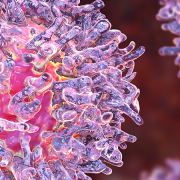Genomics and PCOS
The discovery of new gene variants associated with polycystic ovary syndrome will lead to better understanding and open up the possibility of targeted treatment
Genomic analysis has allowed the identification of new gene variants associated with polycystic ovary syndrome (PCOS). The new findings provide hope for future treatment and management, but also highlight the increasing application of genomics and personalised medicine in common – as well as rare – diseases.
What is PCOS?
PCOS is an endocrine condition that affects the ovaries and is a major cause of infertility in women. It is associated with hormonal imbalance, particularly excess androgens (‘male’ hormones, such as testosterone) and insulin resistance.
It is a common condition and may affect as many as one-in-five UK women, although half will not experience symptoms. Affected women may notice irregular periods, weight gain, acne or skin problems, and facial or body hair.
As well as causing fertility and hormone problems, PCOS is linked with increased risk of type 2 diabetes and high cholesterol, which in turn increase the risk of heart attack and strokes in affected people.
Finding PCOS in the genome
PCOS is known to run in families, but previously known common variants do not account for this heritability. Researchers in New York and Chicago recently published findings that offer new insight, however, after conducting a study of 261 people from 62 families affected by PCOS.
Women of reproductive age affected by PCOS were selected, and their whole genomes were sequenced, alongside those of their parents and sisters, some of whom were also affected and some of whom were not. Levels of metabolic and reproductive hormones were also recorded and used in bionformatic analysis of the data.
Rare variants in the DENND1A gene were present in more than half of the affected families, and two particular variants were found to be linked with PCOS. Perhaps unsurprisingly, DENND1A is involved in testosterone production (women with PCOS often have heightened testosterone levels).
Crucially, although common variants have been implicated in PCOS before, this non-coding variant may be a better predictor of symptoms and a more specific target for potential therapies.
Future hope
“When we understand the genetic pathways that are involved, we can develop drugs to target them. It may be that the gene variants that we’re discovering, which are mainly in the parts of DENND1A, regulate the amount of it that is produced in tissues and maybe some of the structure,” said author Dr Andrea Dunaif from the Icahn School of Medicine at Mount Sinai in New York. “If we understand that, then we may be able to come up with ways to alter the increase in DENND1A activity that happens in PCOS and treat the disease itself and even cure a number of patients.”
As a widespread condition associated with such serious health outcomes as infertility, diabetes and cardiovascular disease, PCOS is in need of greater understanding. Thus, any hope of moving towards better prediction and treatment must be welcomed.
Greater understanding of the genomics behind PCOS could help in early identification and treatment, with the aim of avoiding or reducing long–term health problems and morbidity. Further research could also help in developing new treatments, as well as better understand the complex relationship between androgens and conditions such as diabetes and cardiovascular disease in both men and women.
–









